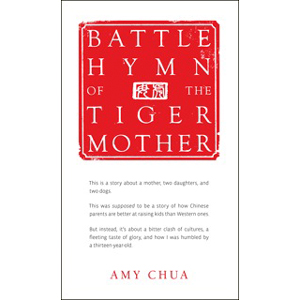
Battle Hymn of the Tiger Mother
 I realize The Battle Hymn of the Tiger Mother by Amy Chua isn’t a parenting book, but when I read her article in The Wall Street Journal in January, “Why Chinese Mothers Are Superior,” I knew I had to blog about it and I figured May, when the world is all a buzz about mothers, was as good a time as any.
I realize The Battle Hymn of the Tiger Mother by Amy Chua isn’t a parenting book, but when I read her article in The Wall Street Journal in January, “Why Chinese Mothers Are Superior,” I knew I had to blog about it and I figured May, when the world is all a buzz about mothers, was as good a time as any.
While I was shocked to learn she’d called her children garbage, I must admit I was intrigued by the idea of a more disciplined lifestyle. The fact that many Western children, as she calls them, attend sleepovers earlier than ever and watch an excessive amount of television made me wonder if maybe she was on to something by denying her children those opportunities. But could I get past her belief that “you have to be hated sometimes by someone you love”?
Granted, I’ve only read the first eight chapters so far, but I must say her candid account of extreme parenting is moving me in ways I hadn’t anticipated it would. I’m one of the Western parents she claims believe they should foster the idea that learning is fun; whereas Chinese parents believe “nothing is fun until you’re good at it.” I let my older daughter quit piano after one year, even though I believe music plays a crucial role in her intellectual development, especially in math, because I grew tired of nagging her to practice so I can’t imagine forcing a child to play an instrument six to ten hours a day. And despite being a teacher for eighteen years, I don’t always put schoolwork first, as the Chinese mother would.
Her extreme parenting started in large part because Chua feared family decline. Immigrant families “will have started off in the United States almost penniless, but they will work nonstop until they become successful engineers, scientists, doctors, academics, or businesspeople. The next generation (Chua’s) “will typically be high-achieving…(but) they will not be as strict with their children as their parents were with them.” Therefore, Chua worried that her children, who have wealthy friends who get paid for B-pluses, are headed straight for decline. Being a parent who frequently feels like my kids don’t know how good they’ve got it, I could relate to her concern.
Basically, Chua argues, “Chinese parents have two things over their Western counterparts: (1) higher dreams for their children, and (2) higher regard for their children in the sense of knowing how much they can take.” While Chua realized she couldn’t make her children like poor immigrant kids, she felt she could make sure her children were more cultivated than she had been.
Chua started with classical music, as she believed it “was the opposite of decline, the opposite of laziness, vulgarity, and spoiledness.” Then, like her parents, she required that they become fluent in Chinese and be straight-A students. Finally, Chua demanded respect from her children the way her parents had of her. “This is where I was least successful,” Chua admits.
“America seems to convey something to kids that Chinese culture doesn’t. In Chinese culture, it just wouldn’t occur to children to question, disobey, or talk back to their parents. In American culture, kids in books, TV shows, and movies constantly score points with their snappy backtalk and independent streaks. Typically, it’s the parents who need to be taught a life lesson – by their children.”
And while I would never threaten to take all my child’s stuffed animals and burn them as Chua admits to doing, I began to think maybe there was something to this whole idea of not only expecting more from your child but yourself.
Follow Befriending Forty at http://befriendingforty.blogspot.com and find out what happens when the person I thought I’d be meets the person I actually became.
Don’t forget to like Parenting by the Book on Facebook for updates on blog posts.






